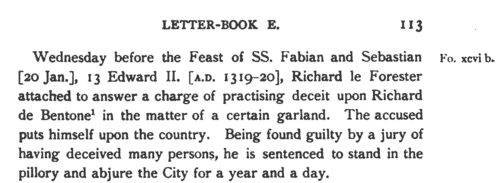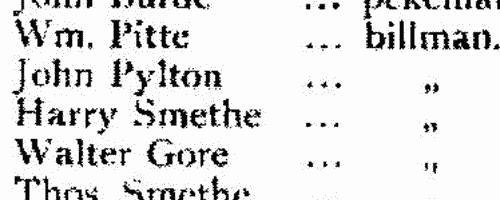Trente Surname Ancestry ResultsOur indexes 1000-1999 include entries for the spelling 'trente'. In the period you have requested, we have the following 23 records (displaying 11 to 20): Buy all | | | Get all 23 records to view, to save and print for £94.00 |
These sample scans are from the original record. You will get scans of the full pages or articles where the surname you searched for has been found. Your web browser may prevent the sample windows from opening; in this case please change your browser settings to allow pop-up windows from this site. Clerks and Clergy in Somerset
(1309-1329)
The register of bishop John de Drokenesford of Bath and Wells, edited by Bishop Hobhouse and published by the Somerset Record Society in 1887. It contains general diocesan business, mostly relating to clergy, but with some parochial affairs and disputes with names of parishioners. There are no ordination lists. The diocese of Bath and Wells at this period was almost exactly coextensive with the county of Somerset. TRENTE. Cost: £4.00.  | Sample scan, click to enlarge

| Freemen and citizens of London
(1314-1337)
Letter Book D, or the Liber Rubeus (Red Book) of the City of London contains enrolments of recognizances between inhabitants, particularly citizens, for sums of money lent or due; grants of pieces of land or property; and various records relating to the city administration, minor infractions, &c. In addition, this volume includes the record of admissions to the freedom of the city by redemption (payment of a sum of money), and the binding and discharge of apprenticeships for the same period. Without freedom of the city - which could only be gained by birth (patrimony), apprenticeship or servitude, or by redemption - no man could open a shop, sell goods retail, or even reside within the city walls (except for a limited time, and then only in the houses of freemen and under frankpledge). The text was edited by Reginald R. Sharpe and printed by order of the Corporation of the City of London in 1902.
TRENTE. Cost: £4.00.  | Sample scan, click to enlarge

| Inhabitants of London
(1314-1337)
Letter Book E of the City of London contains enrolments of recognizances between inhabitants, particularly citizens, for sums of money lent or due; grants of pieces of land or property; and various records relating to the city administration, minor infractions, &c.
TRENTE. Cost: £4.00.  | Sample scan, click to enlarge

| Close Rolls
(1343-1346)
The close rolls of the 17th, 18th and 19th years of the reign of king Edward III record the main artery of government administration in England, the orders sent out day by day to individual officers, especially sheriffs of shires: they are an exceptionally rich source for so early a period. There is also some material relating to Wales, Scotland, Ireland and the English possessions in France.TRENTE. Cost: £4.00.  | Sample scan, click to enlarge

| Grantees of offices, commissions and pardons
(1350-1354)
The Patent Rolls are the Chancery enrolments of royal letters patent. Those for the 24th to the 27th years of the reign of king Edward III (25 January 1350 to 24 January 1354) were edited for the Public Record Office by R. F. Isaacson, and published in 1907. The main contents are royal commissions and grants; ratifications of ecclesiastical estates; writs of aid to royal servants and purveyors; and pardons. TRENTE. Cost: £2.00.  | Sample scan, click to enlarge

| Testators and legatees in London
(1258-1358)
The mediaeval Court of Husting of the city of London sat (usually on a Monday) each week: among its functions was the enrolment of deeds and wills relating to citizens of London. In their strictest technical sense the terms 'will' and 'devise' are appropriate to real estate, and the terms 'testament', 'bequest' and 'legacy' to personal estate, but this distinction is lost sight of in ordinary usage. This calendar of wills proved and enrolled in the Court of Husting was edited by Reginald R. Sharpe, records clerk in the office of the Town Clerk of the City of London, and printed by order of the corporation in 1889. The date of the court is given in italics, with the year in bold in the margin. The testator's name is given in capitals (surname first, in bold), and then a brief listing of substantial bequests, with the names of legatees, and then the date of making of the will, and reference. Sometimes there were further proceedings in the court relating to the will, such as 'It was found by a jury that the testator was of full age when he made the above testament', a statement as to where the testament had been proved, or proceedings on a challenge to the testament &c. - such additional material is added in a smaller typeface in this edition.TRENTE. Cost: £4.00.  | Sample scan, click to enlarge

| London, Essex and Hertfordshire clerks, clerics, monks and clergy
(1361-1374)
Ordinations to first tonsure, acolytes, subdeacons, deacons and priests, from the register of bishop Simon de Sudbury of London. London diocese covered Middlesex, Essex and part of Hertfordshire; the ordinations also attracted many persons from distant dioceses bearing letters dimissory from their ordinaries, and these are duly noted in the text. Many of these clerks would not go on to obtain benefices and remain celibate. The lists of subdeacons, deacons and priests state the clerks' respective titles, i. e., give the names of the person or religious house undertaking to support them. Monks and friars ('religious') are listed separately, and the lists of subdeacons, deacons and priests are also separated into beneficed and not beneficed (or 'not promoted'). The acolyte lists are unusual in giving a parish or diocese of origin.TRENTE. Cost: £6.00.  | Sample scan, click to enlarge

| Somerset testators and legatees
(1501-1530)
Somerset was almost coextensive with the diocese of Bath and Wells, which exercised local probate jurisdiction through its consistory and archdeaconry courts: but superior to the diocese was the province of Canterbury. Somerset testators who also had property outside the county had their wills proved in the Prerogative Court of Canterbury (PCC). The Somerset Record Society embarked on a program of publishing genealogical abstracts of the registered copy wills of Somerset testators in the PCC archives, and in 1903 (volume xvi) printed abstracts edited by the Reverend F. W. Weaver from the PCC registers 1501-1503 (register Blamyr), 1504-1506 (Holgrave), 1506-1508 (Adeane), 1508-1511 (Bennett), 1511-1514 (Fetiplace), 1514-1517 (Holder), 1517-1520 (Ayloffe), 1520-1522 (Maynwaryng), 1523-1525 (Bodfelde), 1525-1528 (Porch) and 1529-1530 (Jankyn). In addition, the volume includes abstracts of 48 Somerset copy wills in the registers of the Archbishops of Canterbury at Lambeth Palace Library from 1363 to 1491. The heading of each abstract gives the year of making the will (not the year of probate) and the testator's name in bold. Below that is the quire number and name of the PCC register. Date and details of probate are given at the foot of each abstract. Spellings of surnames are preserved as they appear in the registered copy wills, and may vary within a single document.TRENTE. Cost: £4.00.  | Sample scan, click to enlarge

| Freemen of London
(1540-1550)
The long series of mediaeval registers and books of admission of the freemen of London was destroyed by fire in 1786. Thirty surviving charred leaves were gathered together and rebound, becoming Egerton MS 2408 in the British Museum. The order is jumbled and generally speaking none can be dated with certainty, although all belong to the very end of the reign of Henry VIII and the start of the reign of his son, Edward VI. These are pages from the admission books. Each entry here usually gives the name of the person admitted to the freedom; his father's name, address and occupation; his entitlement to the freedom, usually by having served out an apprenticeship to a citizen, naming the master and his trade. Then there may follow a cross-reference to M. or N., being two volumes of another set of official books denoted by the letters of the alphabet, and following each other in chronological sequence, which evidently gave details of entries into apprenticeships. These other books no longer exist: but the dates given for entry do identify the start of the apprenticeship, and so give by implication a date for the eventual admission to freedom. In the margin is the name of the city ward and the total of the fee and fine paid on admission.TRENTE. Cost: £4.00.  | Sample scan, click to enlarge

| Militia in Stone hundred, Somerset
(1569)
A muster of the ablemen, gunners, light horsemen, pikemen, archers and billmen available from this hundred, compiled by sir Hugh Paulet, sir Maurice Barkeley, sir Ralph Hopton and John Horner in answer to a royal commission of the 11th year of queen Elizabeth. The returns are arranged by tithing. The hundred consisted of the parishes of Ashington, Brimpton, Chilthorne Domer, Limington, Lufton, Mudford, Preston Plucknett, and (the borough of) Yeovil. (The sample shown is from the return for the borough of Axbridge)TRENTE. Cost: £6.00.  | Sample scan, click to enlarge

|
Research your ancestry, family history, genealogy and one-name study by direct access to original records and archives indexed by surname.
|












